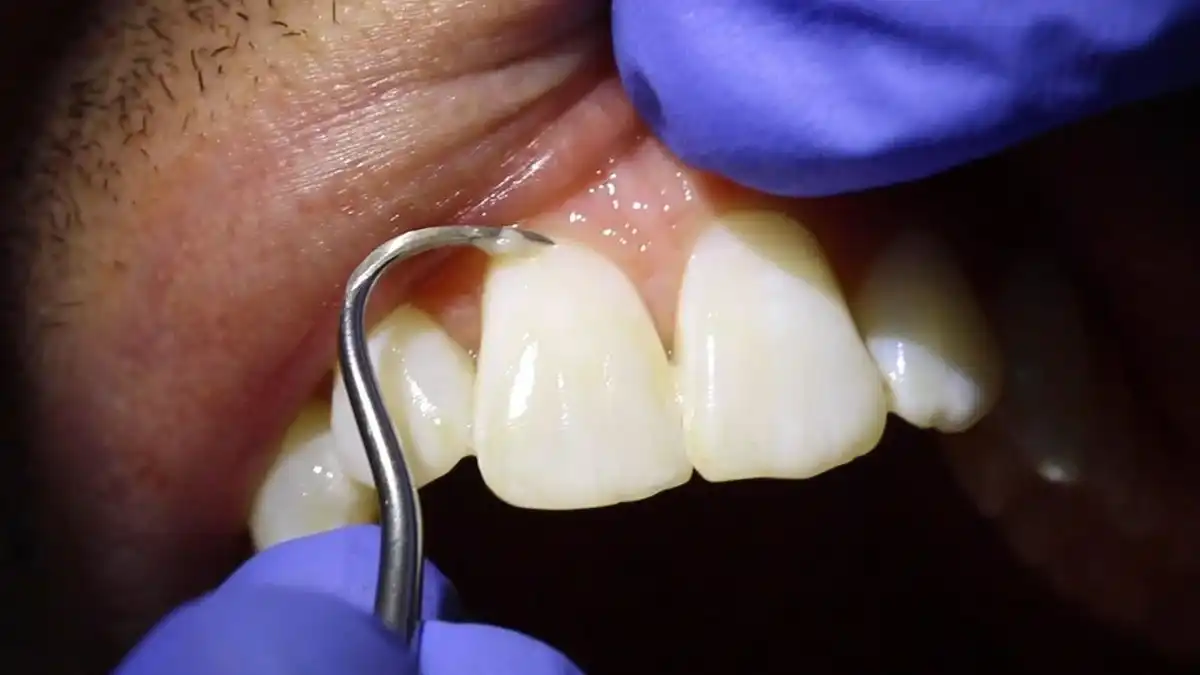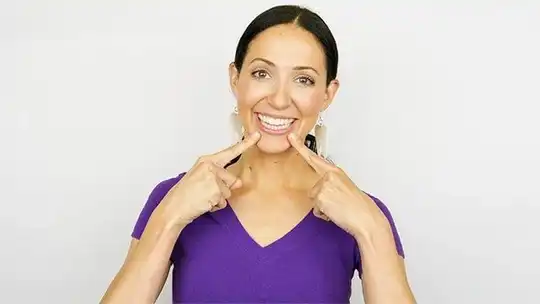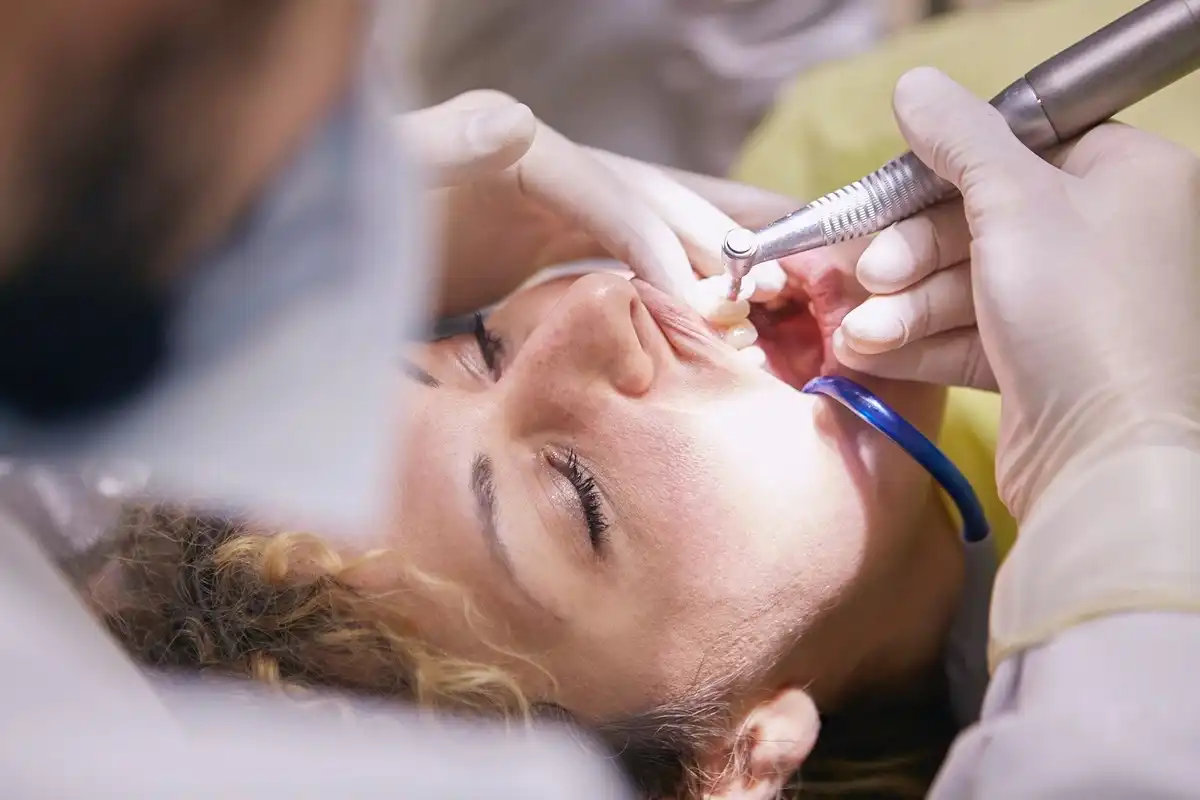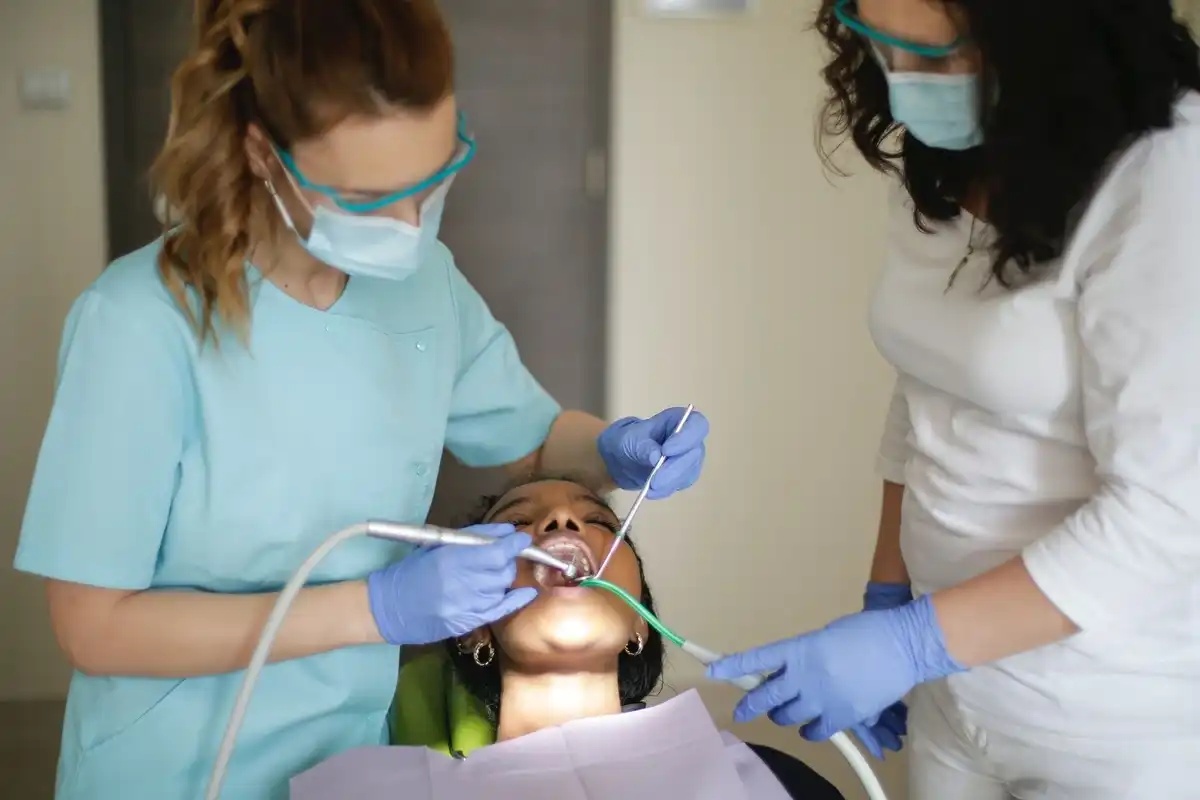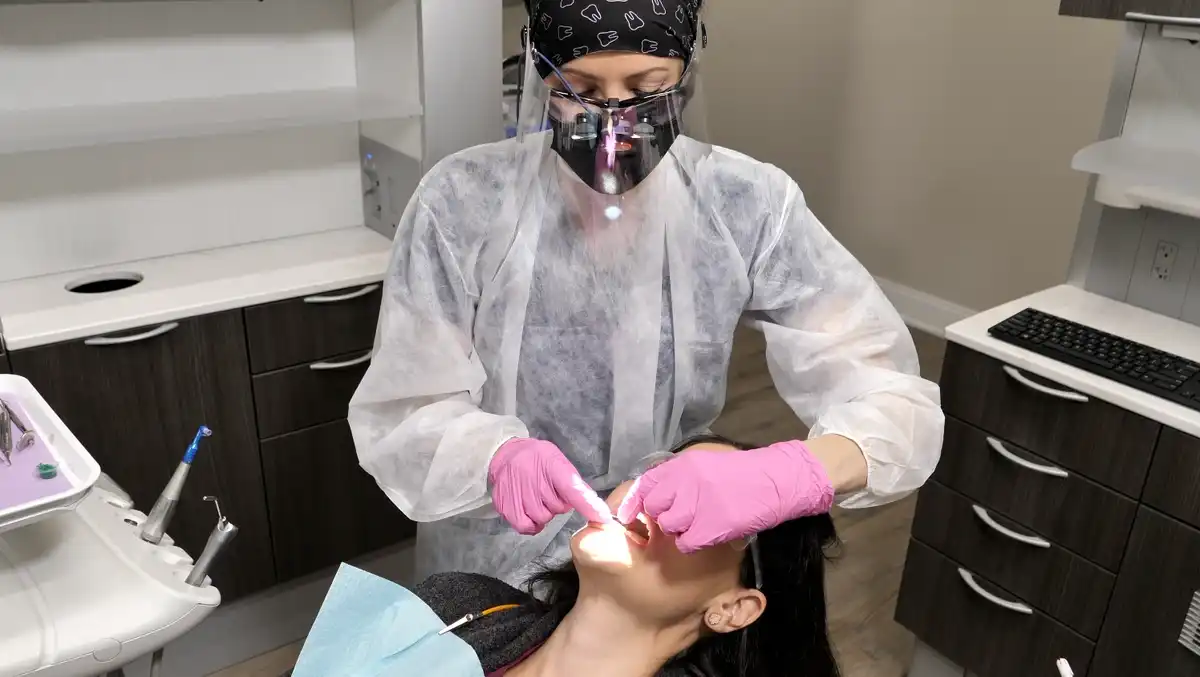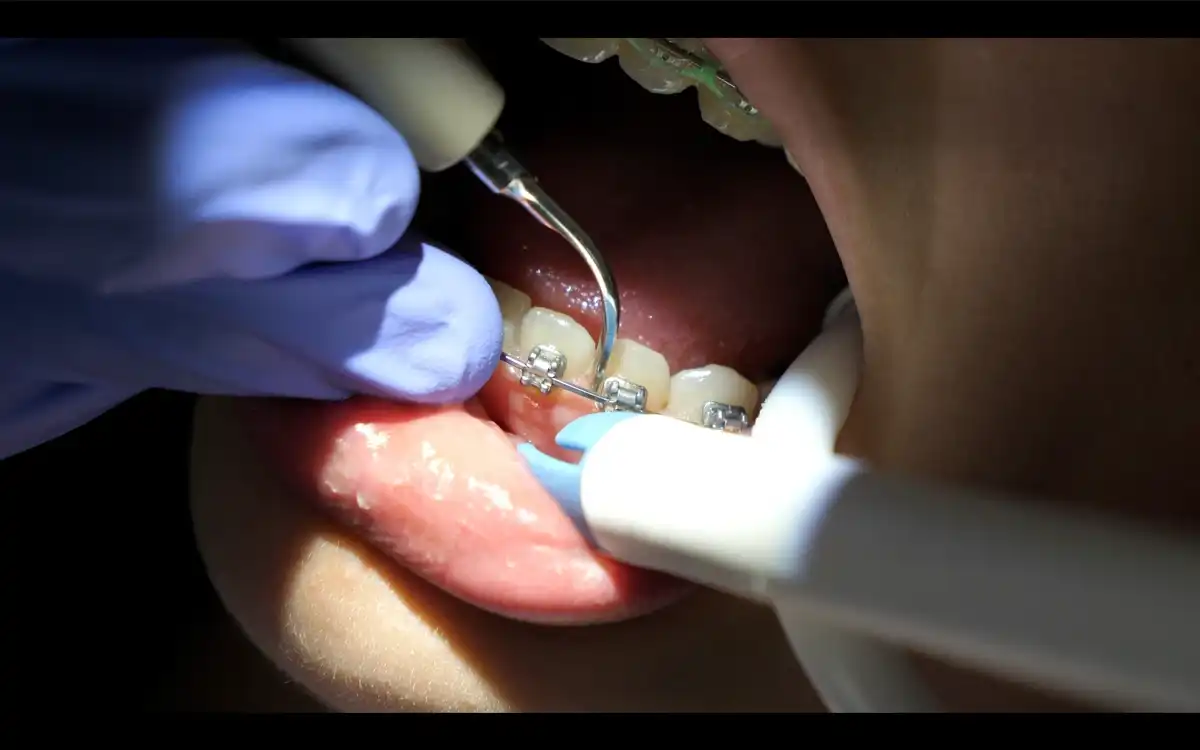How To Become a Dentist: Career, Salary, and Education

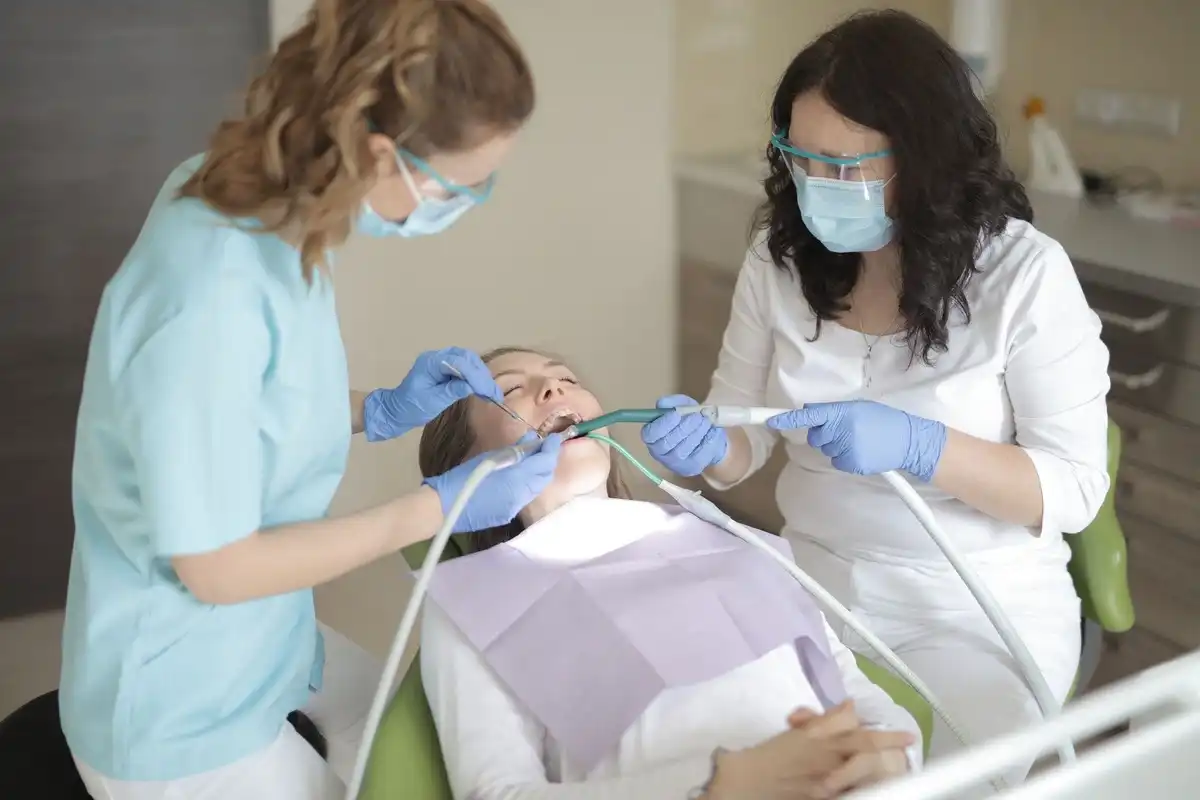
Are you thinking of becoming a dentist? Career-wise, dentists enjoy a great work-life balance when it comes to time in dental school, hourly commitments during the week, and a dentist’s salary. There typically isn’t the same type of work schedule for a dentist as there is for medical doctors, being that they work traditional 8-5 Monday-Friday hours in most cases. There are always exceptions of course. Some people degrees in medicine choose to go the dentistry route because of the “better” schedule and time it allows for personal commitments.
What Is A Dentist?
Dentists are licensed healthcare providers who are responsible for treating oral diseases and conditions related to the teeth, gums, bone, and surrounding structures. In addition to restoring broken or missing teeth, they also provide growth modification and tooth movement through orthodontic therapy, oral surgeries such as wisdom tooth removal, and soft tissue therapies like grafting or gum surgery. They can also offer cosmetic services to enhance the appearance of a person’s smile for elective purposes.
For the most part, advanced treatments like oral surgery, orthodontics, and grafting are left to dental specialists who complete an additional 2-3 years of education on top of traditional dental school, which is 4 years.
Most dentists are family/general practitioners who provide basic, restorative, and cosmetic treatments such as:
- Dental fillings
- Crowns and bridgework
- Dentures
- Gum disease therapy
- Soft tissue modification
- Dental veneers
- Bonding
- Whitening
- Root canals
- Emergency care
- Dental extractions
Dentists are also responsible for diagnosing and screening for non-tooth related diseases, such as oral cancer and systemic medical conditions that present themselves as oral symptoms.
Dentist Career Rankings
Again, a dentist career is a nice balance between traditional dental office hours and a hefty dentist salary, providing a win-win for people considering dental school.
- Median Salary: $158,940
- Stress Level: 6/10
- Work-Life: 8/10
- Career Advancement: 6/10
Dentist Salary Outlook
Ok, so when we discuss a dentist’s salary, what type of a dollar figure are we actually talking about?
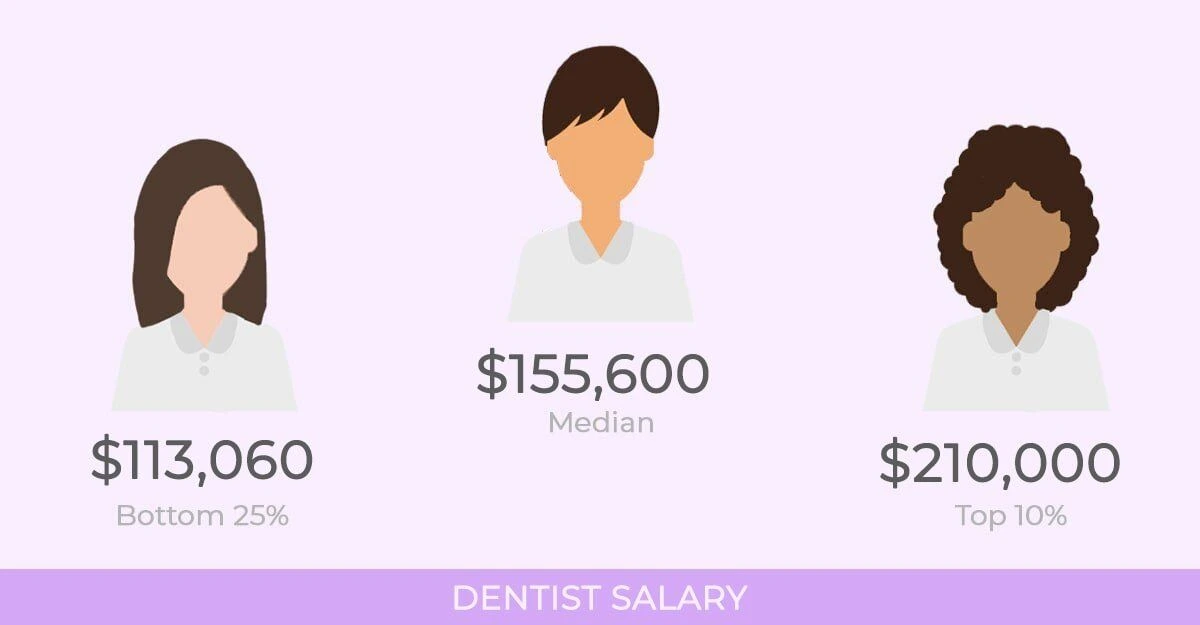
Depending on if you’re fresh out of dental school, any extra post-grad training you’ve completed (maybe you’ve taken a ton of classes on dental implant therapy or sedation), and the location that you live in, the exact salary will vary. But the average nationwide for a dentist is just a little over $150,000 per year. On the lower end, it’s a bit closer to $110,000, and on the higher end, it’s over $200,000. The salary tends to be higher in parts of the country where there’s a higher cost of living or shortage of dentists (such as rural Alaska.)
How Much Does A Dentist Make Per Hour?
Let’s say you’re interested in a dentist's salary on an hourly basis. Some new dentists are coming straight out of dental school and choosing to only work 2-3 days a week because they can still make decent money without needing a full-time job. Others work full time and occasionally fill in on extra days to earn a bonus, especially if they don’t have a family or want to save up for something.
Again, depending on the location (cost of living) and experience, a general dentist is probably earning somewhere in the vicinity of $55-$100 an hour, or an average of $75/hour. The salary will be higher in certain parts of the country, even if you’re straight out of dental school.
Best-Paying Cities For Dentists
Maybe you’re open to moving anywhere in the country once you graduate dental school. If you’re interested in the top-paying cities where a dental salary will be the highest, you’re going to find that it can also parallel with the cities where the cost of living tends to be fairly high (but not always.) Meaning you’ll have higher overhead costs both for running a practice as well as housing/rent.
| City | Mean Salary |
|---|---|
| 1) Burlington, North Carolina | $278,360 |
| 2) Burlington, Vermont | $275,430 |
| 3) Longview, Texas | $272,440 |
| 4) Olympia, Washington | $267,240 |
| 5) Sebring, Florida | $259,660 |
Maybe you’re not completely sold on dental school just yet, so I’ll go ahead and throw in a bonus: The top-paying cities/areas for dental hygiene jobs are all in Alaska and California, with salaries topping out at just over $128,000 per year.
The Best-Paying States For Dentists
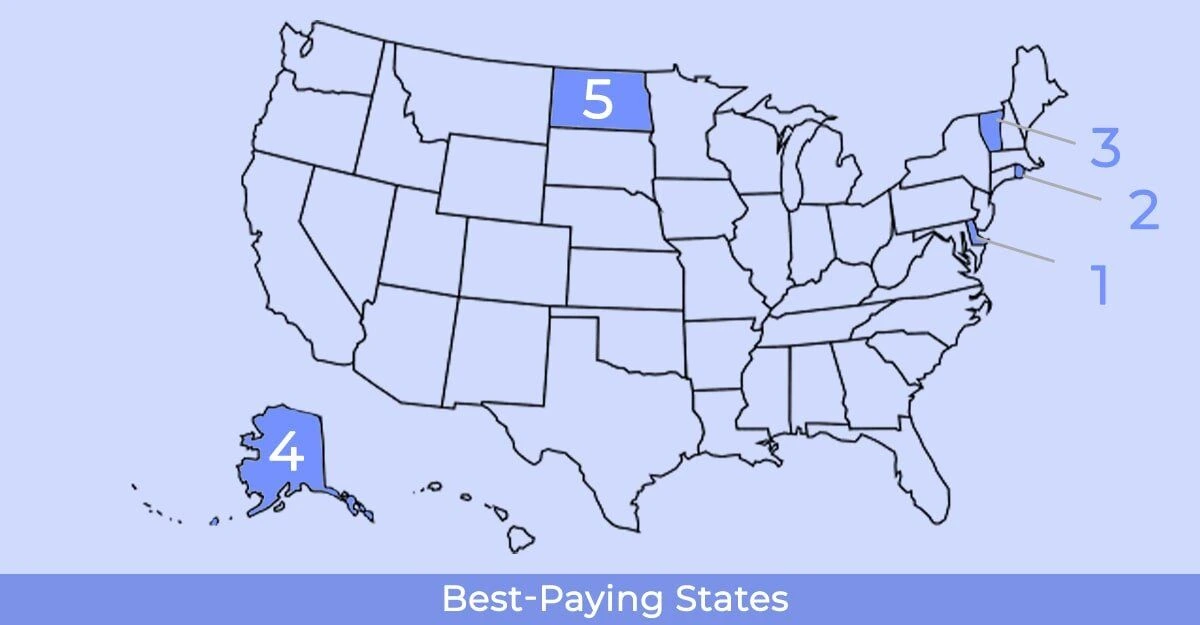
Top 5 Best-Paying States For Dentists
| State | Mean Salary |
|---|---|
| 1) Delaware | $264,440 |
| 2) Rhode Island | $262,900 |
| 3) Vermont | $261,790 |
| 4) Alaska | $239,930 |
| 5) North Dakota | $225,770 |
…each averaging over $225,000 a year, which is $75,000 a year above the national average. When you crunch the numbers a little more, that comes out to just over $110/hr., assuming you’re working 40 hour weeks and taking two weeks of vacation every year. When you look at Delaware by itself, the average is over $260,000 a year ($130/hr. for 40 hours, 50 weeks a year.) If you like Alaska or the New England areas, you’re in luck!
What Is The Salary For A Dentist In California?
Jobs Related To Dentist
Not quite ready to go to dental school? There are other dental related careers that you may want to consider. Each comes with a great work-life balance (because remember, most dentists are working 8-5 each day) or the opportunity to work part-time. Here are some great examples:
Dental Hygienists
The equivalent of a registered nurse in the dental industry. These practitioners have degrees in dental hygiene and state licenses (they’re required to take both regional and national board exams.) The pay isn’t bad either! Hygienists are the ones who clean your teeth, but really, they do a lot more than that.
Dental Assistants
Depending on which state you’re in, dental assistants may go through a college, technical school, or get on-the-job training. Assistants work directly alongside dentists as they perform clinical treatments.
Dental Lab Tech
Are you good with your hands? Dental techs or “lab technicians” are the skilled professionals who work with dental materials to craft custom prosthetics like ceramic crowns, dental bridges, dentures, and more. They usually work in an office separate from the dentist and serve multiple dental providers.
Dental Office Staff
Get a first-hand look at patient care before committing to dental school, to decide if a dentist career is “worth it.” Most offices provide on the job training for scheduling, insurance coordination, treatment planning, and more.
How To Get A Job As A Dentist
There are a few separate steps required to becoming a dentist.
1) Get Into Dental School
First, find an accredited dental school to attend. Attendance is quite competitive, so you’ll need to have all of your science requirements out of the way with as high of a GPA as possible. An undergraduate degree in biology or chemistry is common. Think along the needs of what you need for applying to medical school. You will also need to take a DAT exam, which is a nationwide exam to show how qualified you are to meet dental school requirements and broad scientific knowledge. Check with the dental schools you’re considering, as each one will have slightly different application processes.
2) Pass Your Board Exams
Just before or immediately after completing dental school, you’ll need to take your board exams. The exam(s) typically take at least a couple of days and help to prove you’ve learned (and retained) the information and knowledge required to practice as a dentist. You may only re-test a limited number of times before being required to go back into a remedial/refresher program at dental school to qualify for re-testing. It used to be that there were two parts of board exams, with one being taken around year two of dental school and the other part taken around the completion of your fourth year. But the first part has been discontinued, so now it’s just a two-day exam that’s required.
3) Acquire And Maintain Your License
After you’ve completed (and passed) your board exams, you can apply for a dental license in the state where you plan to practice. Keep in mind that “add on” licenses are available for things like sedation, etc. Each year you’ll also be required to take specific professional education courses to maintain your license and stay abreast of the latest research in dentistry. Depending on your preferences and what you’d like to study, this can be as easy as attending a dental convention once per year to get enough live credit hours. Some may also be self-study.
Job Satisfaction
Being a dentist is an amazing and rewarding job (and not just because of a dentist salary). You truly get to make a difference in the lives of other people. In fact, some dentists get into the profession because of their own dental woes growing up.
When you’re able to transform someone’s smile into something they feel great about, it’s truly life changing. It’s not uncommon to see people cry in the dental chair, not because of fear or anxiety, but because they can eat again or finally have confidence around other people.
The work-life balance of dentistry does tend to be a bit better than a lot of other medical and healthcare jobs. You’re not usually working a 12-hour shift in a hospital or on call every weekend (a lot of dentists will trade off for that). You can choose to have a private practice and be your own “boss” or work for a dental service organization where you’re an employee while their headquarters manages all of the business side of things.
All of that being said, dentistry isn’t stress-free. You still get disgruntled patients, bitter staff, might get bit or thrown up on, and sometimes have to manage tough cases like emergencies. There’s also the fact that you might be managing medically fragile patients who are at high risk, requiring as much energy and attention as you’re capable of. Unfortunately, there were a few years where dentists supposedly had the highest suicide rate among all careers, whether it’s personal or work-related stress isn’t always obvious. But it’s something you want to be aware of before walking straight into a new career that otherwise seems like sunshine and daisies.
Dentist Education Requirements
Every dentist must attend a 4-year dental school. In the United States, even some foreign dentists need to re-complete dental school before taking board exams to practice here. General (family) dentist training is 4 years, while specialists—such as oral surgeons, prosthodontists, endodontists, etc.—need an additional 2-3 years on top of that. Keep in mind, that’s after an undergraduate degree. The average dentist spends a minimum of 8 years total in college, while specialists are studying for 10-11 years.
1) Accreditation
Being accredited ensures that each respective dental school provides the same required, comprehensive predoctoral training to every student. Each graduate will also take the same type of state and/or national board exams.
2) What You’ll Study
During the first year in dental school, you’ll spend a lot of time studying in-depth anatomy, physiology, and biochemistry. You don’t actually start seeing patients just yet. You will however get a bit of time in labs to practice some hands-on activities as you become familiar with the dental profession.
During your second year, you’ll work in a lab more and become heavily familiar with modern dental materials. You’ll also continue learning more about the fundamentals instilled during your first year. This year you’ll probably start practicing on one another (as in other dental students). In years past, you would take a part of your national board at the end of your second year (but this has since been discontinued.)
By your third year in dental school, you’ll still be in plenty of lecture classes. Only this time, it will be more advanced topics. This is the year where the majority of your time, however, will start to be spent on live dental patients. Don’t worry, you’ll have licensed dentists (who are your instructors) there to supervise.
Once you finally reach your last year of dental school, you’ll be fine-tuning your clinical skillset to check off your requirements for graduation. You’ll also be studying for your national board exam.
Types Of Dental Degrees
There are two different types of dental degrees that dentists can earn: DDS (Doctors of Dental Surgery) and DMD (Doctors of Medicine in Dentistry.) Both are completely equal. Neither receives different types of training than the other. The only difference is that some dental schools are set up to award DDS degrees while others award DMD degrees. In case you’re wondering, DDS is the most common.
Both DDS and DMD dentists are trained to diagnose disease, plan treatment, promote good oral health, monitor oral development, perform basic surgical procedures, and administer emergency care.
DDS and DMD degrees receive the same amount of training as one another. They also take the same state board exams and receive the same licenses from the state where they practice.
Online Dental Courses
With so many college classes available online these days, you may be wondering if you can take any dentist classes online. Aside from a lecture course—and usually only in the instance of something like social distancing—that will likely be a no. There may be some labs that can be completed online if there is another shutdown, but dentistry is a hands-on career. As such, you have to complete the training in person. Too much of it is tactile to take the class online.
How To Get Your Dental License
To get a dental license, you’ll need to be able to show proof of graduation, completion of your national board exam, current CPR, and additional state requirements (such as jurisprudence exams, controlled substance education, etc.) You will need to specifically apply and meet the requirements of the state wherein you plan to practice. You cannot get one license and expect to work in multiple states. For a basic checklist, search for your State Board of Dental Examiners (SBDE) where you live or plan to live.
National Boards
The National Board Dental Examination (NBDE) is like a giant final exam of everything you learned in dental school. Dental hygienists have to take a version too. You must pass the NBDE in order to attain a dental license anywhere in the United States. There is a Part I and Part II. Part I (which is now discontinued) used to be taken around year 2 of dental school. Part II is a two-day exam that’s taken close to graduation near the end of the fourth year of dental school.
State Requirements/Boards
Dentistry isn’t like medicine. It is self-regulated in each state. Each state sets specific requirements where you have to apply for and maintain a license. For instance, Texas will have different license requirements than California does, so you can’t simply move from one to the other with the same dental license. Nor can dental hygienists. You’ll still have to check with that state dental board to apply for a license, transfer records, and show that you are legally qualified to practice dentistry. It is technically a crime (up to a felony) to practice dentistry in a state where you do not hold a current license.
License Renewal
Each state has its own requirements for obtaining and renewing dentist (and dental hygienist) licenses. You will need to contact your State Board of Dental Examiners to identify the specific requirements set for those regional practitioners. Typically, you have to take a minimum number of continuing education courses each year and spread them across various dental subjects, to ensure you’re staying up to date with everything. You’ll also need to take a healthcare provider CPR course at least every two years, not to mention other sedation training or non-related training that is mandated by your state.
Continuing Education Courses
Becoming A Dentist
Working as a dentist is great, especially if you want a healthy work-life balance paired with an amazing dentist salary. But getting into dental school isn’t always easy. In fact, it’s extremely competitive. Once you complete four years of dental school and acquire a license, you can easily earn an average dentist salary of over $150,000 (national average) if not more.

Make your inbox smile!
Subscribe
